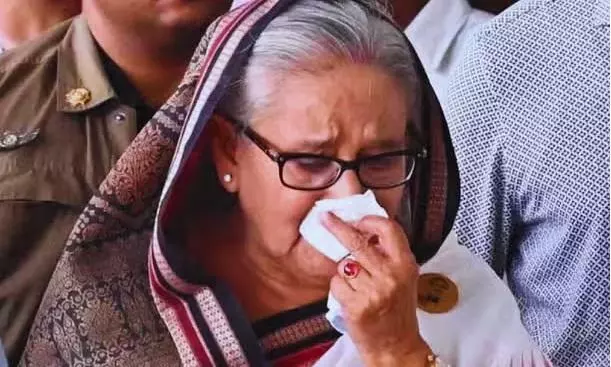
Future of Sheikh Hasina - and of Bangladesh
text_fieldsThe interim government in Bangladesh has demanded India to hand over the former Bangladesh Prime Minister Sheikh Hasina to the country after The International Crimes Tribunal of Bangladesh (ICT) charged her with ‘crimes against humanity’. Hasina sought asylum in India on August 5, 2024, when it was certain after all her efforts to quell the student protests so failed that the protesters were about to capture her. Although the Narendra Modi government has not yet decided on extraditing its close friend, it is almost certain India will eventually have to take a firm decision on it. It is also certain that India, having provided military help at the crucial stage in the struggle led by Sheikh Mujibur Rahman to separate the eastern part of Pakistan to form an independent state, will have to study different aspects of the issue conscientiously before taking an unequivocal decision. India cannot ever forget the profound friendship and cooperation that that Sheikh Mujibur Rahman, Bangladesh’s father of the nation, and his daughter Hasina extended towards it. The fact, however, is that the relations between Bangladesh and India have not been strong or warm whenever other governments took over ousting the Awami League out of power. India has to be wary of the consequences that the country may face when it is not able to work peacefully and harmoniously with Bangladesh’s interim government and the new government coming to power after polls next year. It is clear that this crucial phase will test the Modi government's diplomatic acumen.
It is about time to highlight that there is a powerful other side to the one-sided reports being spread in our country. The most notable thing is that the charges against former Bangladesh Prime Minister Hasina are not bought about by a kangaroo court set up by the interim government or the rivals of the Awami League in Bangladesh. The United Nations Human Rights Commission conducted a comprehensive study in Bangladesh on murders and other acts of terror that police and security forces committed when Hasina let loose them on the student-led protests after they questioned the excess of the Awami League in power for ten years violating all limits. The findings in the indictment against her government are confirmed by the tribunal modeled on the International Crimes Tribunal, which Hasina herself established to try war criminals in 1971. The UN commission has confirmed that there are ‘reasonable grounds to believe that crimes such as murder, torture, imprisonment, and other crimes against humanity have been committed.’ The UN commission has revealed that the government in order to ensure continuity in power carried out widespread and systematic attacks on protesters and civilians using the security forces, intelligence agencies and the Awami League. The report found that at least 1,400 people, including 12 to 13 percent of children, were killed in 45 days.
The non-Muslim minorities in Bangladesh, who generally work with Awami League, would naturally have joined the actions of the government and the ruling party. This background is also being cited as a reason for religious minorities to have been among victims of reprisal that followed after Hasina fled the country. In our country, the extremists only propagated one side of the picture with extreme exaggeration. Former Prime Minister Sheikh Hasina may or may not be handed over to Bangladesh. But the big question is whether a democratic government will ever come to power to bring peace and stability to the country. The leader of the caretaker government, Muhammad Yunus, is looking forward to holding elections by the middle of next year after establishing a peaceful environment through measures including a constitutional amendment. When military opposed it, he offered to resign. The Bangladesh Nationalist Party and the military insist the government hold elections in December this year. They argue that only an elected, popular government, not an interim government, can bring about fundamental change. Where the Awami League has already been banned, the Bangladesh Jamaat-e-Islami is back in action after the Supreme Court lifted the ban on it, allowing to contest elections. In any case, a peaceful and friendly state is undoubtedly more desirable as far as India is concerned.






